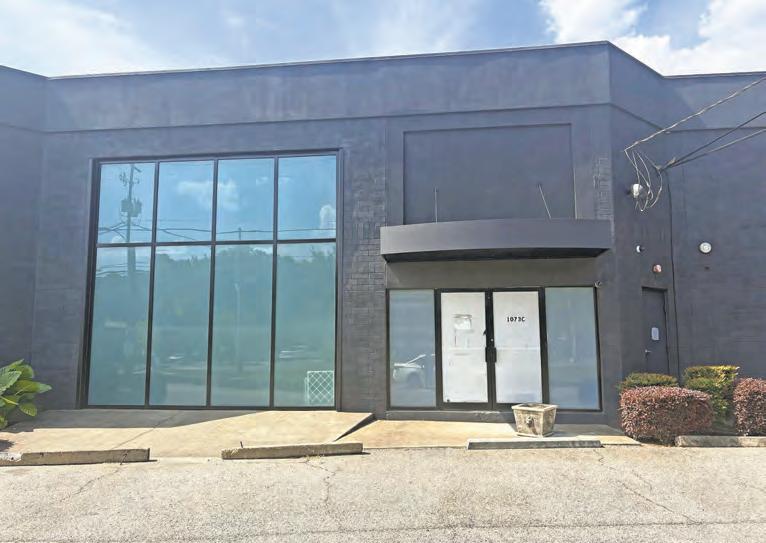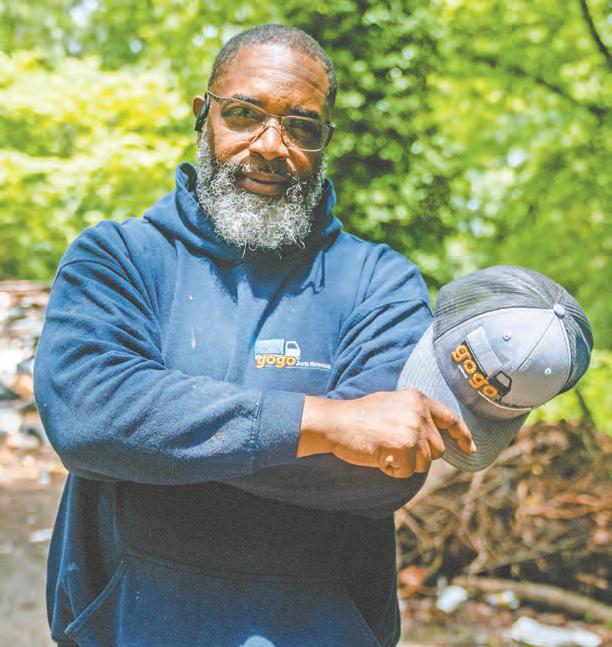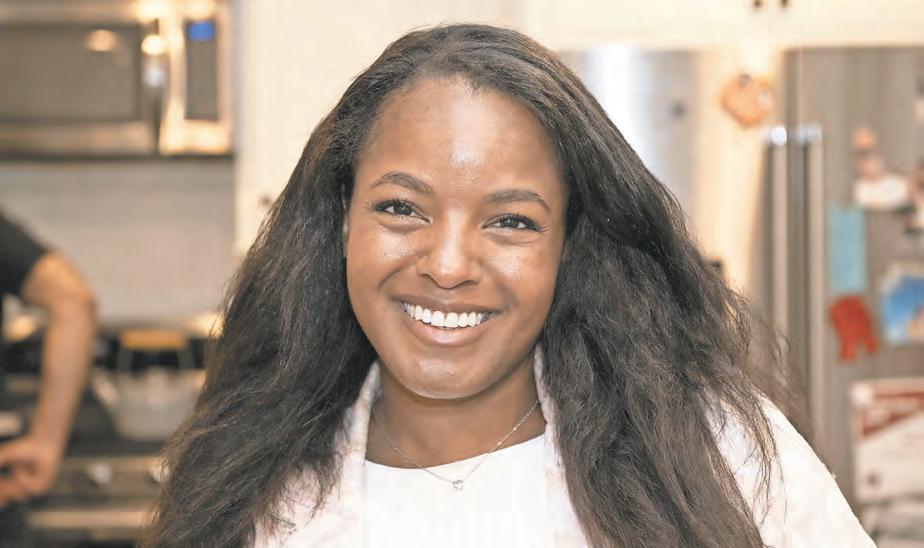




By ISAIAH SINGLETON
Juneteenth is just around the corner! This significant date in American history and the Black experience is not far off.
The name Juneteenth is a play on June 19, 1865. On that day, the Union Army, led by General Gordon Granger, arrived in Galveston, Texas, and announced to the people of Texas that all enslaved African Americans were now free.
To help celebrate the occasion, The Atlanta Voice has compiled a list of events. Check out the following:
Town at Trilith to Celebrate Juneteenth with Two-Day Festival of Freedom, Culture and Creativity - June 13 and 14
The Town of Trilith is hosting its annual Juneteenth celebration on Friday, June 13, and Saturday, June 14. The two-day celebration will feature a dynamic blend of live music, immersive art, children’s programming, and local cuisine, all designed to honor the legacy of Juneteenth and spotlight Black artists and entrepreneurs.
Location: 240 Trilith Parkway, Fayetteville.
13th Annual Juneteenth Atlanta Parade & Music Festival – June 14-15 (10 a.m. – 10 p.m.)
This is an event that celebrates and commemorates Juneteenth. This high-spirited celebration of freedom, unity, and equality offers two entertainment stages and is known for filling the atmosphere and the streets of Atlanta with the soulful sounds of live music, the pleasant aromas of sage, myrrh and frankincense, The amazing hand-made merchandise from local and international vendors, mouthwatering cuisines, and an array of immersive cultural activities for all attendees.
Location: Piedmont Park, 1071 Piedmont Ave, Atlanta
Rejoice It’s Emancipation Day
Juneteenth Celebration: Apex MuseumJune 15 (3 – 5 p.m.)
Celebrate Juneteenth at the APEX Museum with special guests including Dr. Opal Lee, Flint River Community Center Choir, and many more!
Location: 135 Auburn Avenue Northeast, Atlanta
Juneteenth Festival at Adair Park – June 19 (1-7 p.m.)
Welcome to the Juneteenth Festival! Join guests at Adair Park II for a day filled with celebration, music, food, and fun. This event is a wonderful opportunity to commemorate the end of slavery in the United States and honor African American culture and heritage. Come together with friends and family to enjoy live performances, delicious food vendors, arts, and crafts, and more.
Location: 866 Murphy Avenue Southwest, Atlanta.
LGBTQ+ Pride Juneteenth Launch Party –June 19 (7 p.m. – 10 p.m.)


In partnership with South Fulton Arts, creator of Pepsi! Cola Bitch is presenting the final of a three-part conversation series based on her play about heteronormativity and beverage bias from a very Atlanta, very Black, and very Fem Queer lens. The event invites the audience to “taste” the story through a multimedia experience across stage (the play); screen (the documentary); sound (the album); and interactive play (the video game). Rooted in the freedom of Juneteenth and the rebellious joy of J’ouvert, this multidimensional debut honors the past while launching stories of the future. This is also the launch of HTD & Company, a one-stop creative resource hub and network for creatives and entrepreneurs.
Note: J’ouvert is a Caribbean Street festival that precedes the more formal Carnival parade, and is known for its unconventional costumes, revelry, and the use of mud, oil, or powder. The event is free and open to the public.
Location: The Academy Theatre, 599 N. Central Ave., Hapeville

persuade
Celebrate Juneteenth and listen to panelists speak on their
By ITORO N. UMONTUEN
Georgia State Representative Derrick Jackson, a Democrat out of Tyrone in Fayette County, has formally announced his intentions to run for Governor in 2026. Jackson currently represents the 68th State House District, which contains portions of Fulton and Fayette counties.
During his conversation with The Atlanta Voice, Jackson emphasized his 42 years of combined leadership experience in the U.S. Navy, corporate America, and state politics. Jackson believes that experience, which includes seven deployments and four combat missions, will help him stand out in a crowded field of now four Democratic contestants.
“No other candidate on the Democratic side is going to put up a 42 year-long resume like I have,” says Jackson. “And so the Democratic Party must ask themselves the question, do we want to win? Because this is not a high school popularity contest. Anybody could win, you know, the primary. But do we want to win the general election? Right? That’s what matters most.”
Jackson, a life member of Alpha Phi Alpha Fraternity, Incorporated, believes in Dr. Martin Luther King’s axiom “The Urgency of Now.” He desires to help the least of these and be a voice for the voiceless.
“I would be a governor for everyone: White, Black, urban, suburban, rural, Gay, straight,” Jackson says. “Listen, if Georgia is going to be successful, we need to make sure every family in all these areas can thrive. I don’t care if you’re coming from Valdosta or in Rome. You should be able to look at the same entrepreneur that’s in Atlanta and say: I can birth an idea and it will and it will survive, because Georgia is one of those states that would not leave one entrepreneur behind. Not one working class family member behind.”
Jackson has a strong commitment to expanding Medicaid, which could boost Georgia’s economy while improving healthcare access, particularly in rural areas. While former Atlanta Mayor Keisha Lance Bottoms and State Sen. Jason Esteves both push for Medicaid expansion, Jackson says the time is now.
“We’ve been fighting for Medicaid expansion

the last 15 years,” Jackson says. “Georgia is sitting on a huge surplus, and we have nearly $7 billion sitting on the table because one individual, the governor, refused to put his signature on the dotted line to say, ‘Medicaid expansion to Georgia.’ He refused and tried his Pathways Program.”
Governor Brian Kemp’s Pathways to Coverage program, rolled out in 2023, has enrolled about 6,500 Georgians to date. However, an estimated 200,000 Georgians do not have health insurance. To qualify, adults must work, go to school, volunteer or do other qualifying activities for 80 hours a month.
“Hospitals will stay open, we will be able to bring greater access to health care across all of Georgia, especially rural Georgia,” said Jackson. “The last 12 hospitals that closed were in rural Georgia. And so when you think about just simply a signature of a governor saying Medicaid expansion that will increase jobs, keep hospitals open, and will put us on a true pathway to open up more accessible clinics across all of Georgia. There’s no reason why, as rich and prosperous as we are, that we still have individuals who are dying.”


By ASWAD WALKER
Anyone who knows me knows my favorite progressive thought leader is author, activist, lawyer, and Sirius XM Radio show host Lurie Daniel Favors. If you’re familiar with Favors, you’ve probably heard her use the phrase WEI – on the regular. For those unaware, WEI stands for “white, entitled and inept,” or “white, entitled and incompetent.” Either works just fine.
Favors coined the phrase out of disgust with the national framing and defaming of the acronym DEI (diversity, equity and inclusion).
Used as a derogatory label to paint all Black people with the brush of inferiority, DEI, for white nationalists (and their off-white “help”) is their stamp of disapproval of everything and everybody Black.
DEI Demonized
Favors wasn’t having this all-out assault on DEI (and implicitly, Black people) by the Trump administration and the entire Republican Party. She, like so many of us who “are like us,” immediately saw through the shenanigans of non-melanated folk using the phrase DEI to define and demonize Black people as being unqualified and thus underserving of seemingly all positions.
Favors, like the rest of us, was reminded that racism is the combination of biases backed up by institutional power. And that the biases that demonized three positive, uplifting words (diversity, equity and inclusion) were backed up by the institutional power of corporations and governments (local, state and federal).
The result: Hundreds of thousands of Black professionals have been fired and replaced by white people who more often than not lack both the experience and qualifications that the fired Black professionals brought to the table.
Case in point: Brother Lloyd James Austin III, a retired United States Army four-star general, who led the U.S. Department of Defense from 2021 – 2025, was replaced by WEI hire Pete Hegseth, a FOX News weekend anchor.
According to military scholars, former military officers, and political

scientists, Hegseth has made errors so egregious that they have put countless government workers, military personnel and the entire country at risk.
Hegseth’s mother described him as an abusive drunk who didn’t belong anywhere near nuclear codes, military secrets or human beings, for that matter.
Another brother, Miguel Angel Cardona, the Biden/Harris administration’s Secretary of Education, built his entire professional career in education, literally teaching at all levels… from elementary to college. He was fired to make room for someone whose Q&A appearances before Congress showed her complete and utter lack of knowledge about any aspects of education.
The current DOE leader, Linda McMahon, wasn’t even familiar with the global phenomenon that is reshaping the educational landscape—AI (artificial intelligence).
McMahon referred to AI as A1 (as in A-One… as in the steak sauce). McMahon, who has zero educational credentials but comes with pockets full of sexual harassment lawsuits against her, wrote a letter to Harvard demanding that the University acquiesce to Trump’s anti-DEI policies. The good people at Harvard responded by marking up McMahon’s letter with so much red (from all of McMahon’s grammatical errors) that it made the Game of Thrones’ “Red Wedding” look like a white Christmas.
The drop-off in educational accomplishments, professional achievements, institutional knowledge and on-the-job experience from Austin and Cardona to Hegseth and McMahon is embarrassingly astounding. It’s like falling off a Denver Mile High cliff into a below sea level New Orleans swamp (absolutely no shade meant to New Orleans, by the way).
Yet, under the white nationalist rubric of DEI inferiority, any person of color in any position, be they Austin, Cardona or any of the hundreds of thousands of Black women who recently lost their jobs due to DEI reasons, giving these positions to unqualified, untested, unintelligent and uncouth individuals simply because they possess white skin, is the kind of entitlements Trump and crew are perfectly fine with.
You may recall that Trump connected DEI with the horrific January 2025 crash between a commercial jet and an Army helicopter that killed 67 people. Funny thing about statistics, though. They reveal that zero U.S. plane crashes had Black pilots at the helm. Well over 90% of U.S. airline crashes had white men flying those planes. The only thing Black involved in that tragic crash over the Potomac River was the plane’s black box.
And after Trump’s DEI policies booted all kinds of Black and Brown folk out of air traffic controller and other aviation-related positions, planes started crashing left and right.
These realities back up Favors’ assertion that DEI math is real and it’s spectacular.
She often says, DEI math equates that because Black people have to work twice as hard just to get half as much as their white counterparts, once Blackfolk are in the same room with them, “The Blacks” are four times more qualified.
She points out that this Black reality “is what it is” simply because of the system of generational discrimination America’s white-favoring society set up, so white workers never had to face straight-up, level playing field-type competition from Blackfolk. And when the doors were
finally open… again, we had to climb mountains, swim across oceans, produce grades that were intergalactically high just to get a job next to Mediocre Mikey.
This is why WEI is the real demon in this country. The immeasurable damage that WEI hires Hegseth and McMahon have already caused in just a few months isn’t even the tip of the iceberg.
MAGA world’s anti-DEI fetish, along with South African apartheid baby Elon Musk and his DOGE crew’s destruction, brought on the purge of hundreds of thousands of government workers. These are folk (many of whom are Black and Brown) who have done their jobs with honor and distinction, regardless of who was in the White House. Still, they are set to be replaced with a WEI hiring spree that will look like a snowstorm.
And if recent past is prologue, the damage Hegseth and McMahon have done as WEI hires will pale in comparison to the damage soon to be unleashed upon society by an army of roughly 50,000 WEI hires “running” everything from Social Security to Medicaid dispersals to nuclear power plant oversight. Yikes.
And I haven’t even mentioned the damage these WEI hires have done to America’s global standing. As we “speak,” world powers and nations are re-aligning and forming their networks of mutual economic benefit, leaving the U.S. to allow these inferior and dangerous WEIs to figure things out. Lord, Lord.
The potential future damage WEI hires can have on the country and planet is incalculable. Why? Every day, they one-up their stupidity and ineptness. Every day, a newer, higher (or lower) level of “dumbassity” is reached, plunging the nation and its inhabitants deeper into a dangerous economic, political, healthcare and
abyss.
DEI was never the problem. The drain on this nation’s progress has always been caused by members of the WEI club fighting tooth and nail to maintain their privileged and unearned position.
America and the world will continue to suffer from this WEI virus and its after-effects… unless and until we recognize it as the real evil to our well-being that it has always been.
FOUNDED May 11, 1966
FOUNDER/EDITOR
Ed Clayton Immortalis Memoria
PUBLISHER/EDITOR
J. Lowell Ware Immortalis Memoria
The Atlanta Voice honors the life of J. Lowell Ware.
PUBLISHER Janis Ware
PRESIDENT/ GENERAL MANAGER
James A. Washington 2018-2024
EXECUTIVE ASSISTANT TO PUBLISHER
Chia Suggs csuggs@theatlantavoice.com
EDITOR IN CHIEF Donnell Suggs editor@theatlantavoice.com
GENERAL ASSIGNMENT REPORTERS Isaiah Singleton isingleton@theatlantavoice.com
Laura Nwogu lnwogu@theatlantavoice.com
EDITOR AT LARGE Stan Washington swashington@theatlantavoice.com
MANAGING EDITOR, DIGITAL Itoro Umontuen iumontuen@theatlantavoice.com
ADVERTISING, SALES & CIRCULATION
ADVERTISING ADMINISTRATOR
Chia Suggs advertising@theatlantavoice.com
SALES
RDW Jackson rdwadman@gmail.com
CIRCULATION MANAGER
Terry Milliner
SUBMISSIONS editor@theatlantavoice.com
DIRECTOR OF PUBLIC RELATIONS
Martel Sharpe msharpe@theatlantavoice.com
CONTACT INFORMATION
633 Pryor Street, S.W. Atlanta, GA 30312 Office: 404-524-6426 info@theatlantavoice.com


BY JAMES A. WASHINGTON
The Atlanta Voice
You know God uses people in the strangest ways to carry out His will. Maybe I should say God uses strange people to carry out His will. After all, the bible comprises men and women chosen by God to exercise heavenly strength here on earth. Moses was a murderer. Paul killed a few Jesus lovers in his time. Rahab was a ‘ho’ and Jacob was, well, y’all know all about Jacob’s shortcomings. The point is that God uses the least of us to carry out His plan, despite what we think we’re capable of or are worthy of. Most prophets were reluctant participants in how God’s message for His people was delivered. Most did not want anything to do with carrying the Word either because they didn’t think they were worthy, or they didn’t think the people would listen, or they didn’t feel the people were worthy of God’s blessing and deliverance in the first place. Whatever the reason, we should all be mindful that the hand of the Lord is at work where He deems it will do the most good. Regardless of what we think, anyone and everyone is a candidate for greatness in the eyes of the Almighty, including you;
You cannot refuse God when He comes a-knockin’
yes, even including me. I used to think that only those called to preach had the gift of ministry. Try telling that to anyone who has accepted Jesus Christ as their Lord and Savior, and see how far that misguided thinking gets you. Slowly, I’ve come to accept that we all have a ministry according to the will of God. Neither economic status, social class, or educational attainment means anything if God says it’s your turn to do His bidding, carry His message, or let others see Him in you. One thing is for certain. You cannot refuse God when He comes a-knockin’. Just ask Moses, or Ezekiel, Isaiah, or even Jeremiah. More importantly, ask yourself, as I have lately, what are you reluctant to do in the name of God? Only you know if you’re in denial. Only you know if you’re trying to convince God to choose somebody else. How long will it take you to realize, as they all did, that sooner or later, you’re
going to do what God is telling you to do? You might want to get that conclusion before God stops asking you to do anything and starts telling you. You know God might take no as your answer and abandon you altogether. The prospect of that gives a whole new meaning to “When I say to a wicked man,’ You will surely die,’ and you do not warn him or speak out to dissuade him from his evil easy in order to save his life, that wicked man will die for his sins, and I will hold you accountable for his blood.” Ezekiel 3:18. In this, do I now believe that the measure of your life and mine is how we respond to God’s call, not how hard we work, even if we somehow judge that work as benefiting others. We all must still obey according to what we’re called to do. The question is then, how do we know when God is talking to us as opposed to someone or something else? I must confess that God will not allow
Himself to confuse you. I believe He is talking all the time. The key for us is to make a deliberate and conscious effort to hear Him. That requires persistence and prayer. Together, listening becomes habitual. To all of you who hear what I’m trying to say, know I’m trying to hear God and each and every day. In doing so I’m obligated to share with you that maybe my job and my calling are to accept as a blessing this platform, use it as but another wonderful conduit for God’s will and continue to say very loudly and clearly that Jesus is Lord and if you also believe this, then you better tell somebody.
May God bless and keep you always.



This column is from James Washington’s Spiritually Speaking: Reflections for and from a New Christian. You can purchase this enlightening book on Amazon and start your journey toward spiritual enlightenment.
https://theatlantavoice.com/warehouse-studios/
By DONNELL SUGGS
The broken windows and burneddown apartment homes are the first indication that Bolden Townhomes, which are located in the shadow of the Oakland City MARTA station at the intersection of Island Terrace and Oakland Drive in Southwest Atlanta, is yet another example of urban blight in the city.
On Friday morning, Bolden Townhomes residents and representatives from the Housing Justice League gathered near the entrance of the complex for a rally. The apartments have been described by many as “unlivable” and “illegal.”
“There’s a lot going on here,” Torrieanna Good said.
“My neighbor’s whole kitchen ceiling caved in on her. We can’t get management to listen to us.”
Good has lived at the Bolden Townhomes apartment complex for three months, and she’s already over the experience.
“We were paying our rent until the manager took off on us,” Good said.
According to Zumper.com, the rent at Bolden Townhomes ranges from $1,095 to $1,295. The interior and exterior photos of the apartments on the website are a world away from what can be seen today. Those prices are well below the average rent in Metro Atlanta. For example, the average cost of a one-bedroom apartment in Atlanta is now $1,758, according to data provided by RentCafe.com.
There are only two dumpsters at the apartments, and as of earlier this week, they were overflowing before management finally had them emptied. That does little to change the fact that many of the two-story townhome units have been without electricity and/or running water for weeks.
In 2025, there are apartments in Atlanta without running water. Residents like Michael Stinchcomb can’t understand how this is happening.
“I think it’s ugly and I think it’s illegal,” he said. “If you’re going to put somebody out, you should go through the proper system.”
Stinchcomb, who has lived at Bolden Townhomes with his girlfriend for the past 5 months, said he had to get the stove for their unit from a unit that was no longer in use after a fire. He told The Atlanta Voice that a maintenance man told him to do it.
“It’s the saddest thing I have ever seen,” said Stinchcomb. “I’ve never seen anything like this.”
Amber Williams, holding a puppy in a blanket, told the assembled media that the apartment she shares with her mother has mold and a leaking roof.
“We need somebody to do something and to take action,” Williams said.

Lamar Strong, who moved to Bolden Townhomes from South Georgia, has only been there for three months. Ge calls what he is seeing at the complex “crazy.”
“When I moved here, everything was OK, and all of a sudden things started messing up,” Strong said.
Many residents like Good, Williams, Stinchcomb, and Billy Dodd said they are paying their rent, which is as much as $1,200 per month.
A notice on the door of the management office from the City of Atlanta’s Department of Public Works, Solid Waste Services, acknowledges a violation of services. Attempts to get someone in management to answer the door on Friday were for naught. There wasn’t anyone there.
Residents say they haven’t been able to reach management with complaints or pay their rent. The online portal isn’t working either, Williams said. The situation has been this way for several weeks, according to Montavious Vaughn, who held a sign that said, “Housing is a human right.”
“The kids and the older folks are the ones who are suffering the most,” Stinchcomb said.
A few feet away from him stood a little girl in a white t-shirt, grey shorts, and pink sandals. On Friday morning, she held a colorful sign that read, “Homes for All.”


By NOAH WASHINGTON
Anew career college designed to train underserved populations for immediate job placement is opening in West Midtown Atlanta, offering trade programs specifically tailored to individuals facing employment barriers while aligning with the city’s workforce development initiatives.
Marion Skinner founded Workforce Career Center, which specializes in programs in construction, medical, artificial intelligence, and culinary trades. The institution serves students who may not pursue traditional education paths and those from underserved communities who need direct pathways to employment.
“We focus on serving students who may not typically pursue traditional schooling,” said Skinner, founder and CEO of Workforce Career Centers. Skinner’s been in education since 2018, building trade, vocational, and career schools across multiple states.
The West Midtown location was strategically chosen for its central accessibility and public transportation access, making it easier for students to attend classes. The school operates additional locations in Texas, Florida, and Maryland, creating a multi-state network of career training facilities.
The center targets two primary demographics: individuals aged 18-24 who are single parents, unemployed, underemployed, formerly incarcerated or receiving government assistance, and those 25 and older facing similar challenges, including unemployment, underemployment, SNAP or TANF benefits recipients, dislocated workers or homemakers re-entering the workforce.
Program offerings span multiple high-demand industries. Medical field training includes certified nursing assistants, phlebotomy, and patient care technicians. Transportation programs feature commercial driver’s license training with dispatching and logistics components. Technology and telecommunications training encompasses fiber optics installation and data technician certification through a partnership with Data Bank. Creative industries are represented through radio, television and film programs, along with graphic design, set design and fashion design tracks. The school also offers insurance adjusting certification and construction trades including electrical, HVAC and plumbing programs.
The facility’s design immerses students in environments that mirror their future workplaces, providing hands-on experience that prepares them for immediate employment upon graduation.
Skinner brings extensive entrepreneurial


experience to the educational venture. A serial entrepreneur with background in the music industry and marketing, including work with Nouvo liquor and the tequila brand Espatada, Skinner also built a trucking company serving major accounts like FedEx and Amazon and helped HelloFresh expand operations in Texas.
The inspiration for Workforce Career Center emerged when Skinner learned that state funding was available for CDL training, sparking the idea to train drivers directly rather than relying on traditional educational pathways.
Skinner was first approached by Georgia workforce officials in September 2024 to

replicate the successful model he had built in Texas. “They wanted me to do exactly what I did with the school in Texas here in Georgia,” he said. After accepting the invitation, Skinner took possession of the Atlanta facility on May 1, 2025, and quickly moved to ready the campus for an August opening.
The establishment aligns closely with Atlanta Mayor Andre Dickens’ focus on youth development and workforce training. The school aims to upskill individuals aged 16-24 and equip them with marketable trades for direct workforce entry, addressing both individual economic mobility and broader city economic development goals.
“We hope students will gain the ability to provide a better life for themselves and their families through education and improved job opportunities,” Skinner said.
The center’s primary mission centers on training students and immediately placing them in jobs upon program completion, emphasizing rapid workforce entry over extended academic programs. This approach addresses the immediate needs of underserved populations while meeting employer demand for skilled workers across multiple industries.
The center will officially open on August 2nd, 2025 and is located on 1073 Huff Rd NW, Suite C, Atlanta, GA. 30318.
By TABIUS H.
It’s 10:30 a.m. on a Wednesday morning in Decatur. The sky is slightly overcast, and birds chirp overhead in a large residential subdivision. A quiet lull settles over the cul-de-sac.
But that wouldn’t last long.
A white F-250 with the words “GoGoJunkRemoval.com” in bright red, hauling a large dump trailer, came down the hill, stopping at a home. Tyron Holmes got out of the truck, greeted his client with a smile, and got to work.
“How you doing this morning?” Holmes said.
Holmes and his working partner, Zay, quickly cleared the debris from the client’s driveway, which included everything from old produce-filled grocery bags to an old ottoman.
Holmes told The Atlanta Voice that he’s not new to the junk removal business.
“Been running this business over eight years,” Holmes said as he and Zay drove the junk to the Seminole Landfill to recycle the abundance of throwaways in the back of his trailer.
For almost a decade, the company has been responsible for positively servicing metro Atlanta and surrounding cities across the state.
However, the concept of GoGo Junk Removal is one that even Holmes didn’t originally anticipate.
“I originally started out doing plumbing. I was a certified plumber,” Holmes said. “I was making a good amount of money plumbing.”
A native of Macon, Holmes learned the plumbing trade while incarcerated for ten years during his early 20s.
“I was young and just influenced by the wrong things in the street,” Holmes says with a grin on his face. Perhaps the smirk is driven


by the fact that over 30 years after being out of jail, he’s made a good name for himself as a 54-year-old business owner.
“God really had to sit me down and get me back on the right path,” he said while reflecting on that period of his life.
After being released from jail in the late ’90s, at around the age of 22, Holmes would go on to use the skills he learned from plumbing while incarcerated to earn his state plumbing certification.
“I became one of the top plumbers in Macon,” Holmes said. Holmes’ credibility would soon be heard about by a plumbing company in Atlanta, bringing him to the city in the late 2000s.
It wasn’t until after over a decade of

residing here in Atlanta that Holmes would birth GoGo Junk Removal.
“I noticed that after a lot of the plumbing repairs were done in houses, they needed someone to throw away a lot of the leftover trash,” Holmes said.
2017 marked the first year of business for GoGo Junk Removal, specializing in removing general junk, construction debris, and weather debris.
“It was OK at first starting out,” Holmes said, as the business was fairly small and had a well-established communal presence in Decatur.
“The more I started to grow and get commercial attention, my competition level went up,” Holmes said. GoGo Junk Removal began to face competition from large whiteowned national junk removal businesses, with GoGo being one of the very few Black-owned junk removal businesses.
“This business has its ups and downs,” said Holmes. Matters such as down seasons, a website hacking attempt, unexpected repair costs of equipment, and false generalizations about being Black-owned are just a few of the obstacles Holmes faces as a business owner.
“Often people think because we’re Black, we’re going to slack,” said

Holmes when reflecting on some of the common misconceptions he hears about Black-owned businesses.
“We been in business for over five years, and you know they say if a business makes it past five years, they’re likely to stay successful,” says Holmes, slowly followed by a mild chuckle.
Perhaps GoGo’s nearly decade of success comes as no surprise, as he prides himself on not just having a junk removal business to generate income, but to mainly help the community and those around him. A consistent churchgoer, Holmes mentions that he’s always giving free advice to the youth at his church on starting a business and the value of working for themselves.
“I try to give the people in my community an opportunity,” said Holmes.
This is something his employees can testify to as well. “I learned from Tyron how to professionally conduct yourself when doing business, even in your appearance,” GoGo employee Lazarian Bloodsaw said. Holmes’ motive in the junk removal business is deeper than just collection and disposal. Most importantly, it’s about treating people with respect and setting a good example for those that work for his business.
“It’s my responsibility to keep the business going and organized for them. They have kids and families to feed just like I do,” Holmes said.

By ITORO N. UMONTUEN
Blavity brought their annual conference, Blavity Fest, to Atlanta for the very first time this weekend at Lee+White in the Historic West End. Blavity Fest highlighted discussions on Black-owned community building, financial literacy, mental health, entertainment and entrepreneurship. The key sessions featured conversations with Atlanta Mayor Andre Dickens and Dr. Lakeysha Hallmon of The Village Market.
While the Trump administration attempts to take a meat cleaver to the Minority Business Development Administration (MBDA), Dickens highlighted Atlanta’s efforts to support minority businesses. That includes a 35% minimum contract allocation and $370 million in minority contracts.
“[Mayor] Maynard Jackson said 25% of every contract that the city of Atlanta does has to go to a minority-owned business,” Dickens explained. “And that was important. Back in 1974, this man said that now we’re above 35% is our minimum, and we keep growing to 40% is my goal, even as right now the federal government threatens to take away these programs.”
Meanwhile, Hallmon sits on the board of Invest Atlanta. Although it’s not a non-profit, its aim is to advance Atlanta’s global competitiveness by growing a strong economy, building vibrant communities, and increasing economic prosperity for all Atlantans. The key is creating a holistic, supportive environment that provides resources, opportunities, and a strong community network for minority entrepreneurs.
“It takes will. Fill your cup, fill your hearts, and fill your spirit with people of like minds who can see you during days in which you look in the mirror and you cannot even recognize the person you see,” Hallmon says. “You need some friends to hold a mirror up and affirm you, girl or dude, remember what you’ve already done. Remember that you are given a vision that nobody else was given.”
Teri Ijeoma shared trading strategies, stressing the importance of selecting the right brokers, companies, and using stop losses to protect investments. She also advised on the benefits of margin accounts and active trading in the current economic climate.
“When you open up your brokerage account, instead of selecting a cash account, select the margin account,” Ijeoma explains. “There’s usually somebody in the audience that is going to write me a letter afterwards, they say, ‘damn it: I cannot believe that you



told them to invest in a margin account’, because the margin account is a little more risky, but here’s what it does. One, it gives you more buying power.
Through her company Trade and Travel, Ijeoma has taught 40,000 people how to actively invest. Plus, she also showed hundreds of thousands how to invest in other ways, including passive investing and opening savings accounts.
“But another thing a margin account lets you do is it lets you trade faster,” Ijeoma continues. “In a cash account, when you sell your stocks, you have to wait three business days for money to come back. But in a margin account, when you sell your stocks, the money is available to you the very next day.”
Blavity will return to Atlanta in 2026
This year, Blavity featured influencers like Keith Lee, actresses like Marsai Martin, and the multi-hypenate creative David
Quarles IV. Also, 2 Chainz and Kirk Franklin performed to close out the weekend. In addition, more than 30 vendors were featured at Lee+White during the event.
“We picked Atlanta because Atlanta is such a mecca of the intersection of culture, politics, creatives and entertainment,” explains Morgan DeBaun, CEO and Founder of Blavity. “We also wanted to pick a city that was a destination. So many people in our community have Atlanta because they’re connected to somebody there. Whether they attended Spelman or Morehouse, or their cousins or friends live there. Or, they want to go to concerts that are there.
So Atlanta is just a great Black city that allows us, as a national brand, to make sure it’s accessible to people. And it’s just a great time. Springtime in Atlanta is the best. So
much to do, so much to see. We also wanted to pick a city where if you’re coming to our conference for one or two days, you’re going out at night, there’s things to do, there’s people to see.”
In the end, culture has an economic value and an intrinsic value as well to the Black community. Blavity Fest is a must-attend event that offers both professional development and cultural celebration.
”And let me tell you, if the only connections you make are the people that’s sitting on the stage, you miss the gift of being in a room and sitting left and right to people who are who can be stewards of the very thing that you are trying to pivot from right now,” said Hallmon. “So look around this room and see the people, and also sit in your seat and know that you are deserving.”
By QUINTESSA WILLIAMS
Word In Black
In the classic sci-fi movie “Minority Report,” Tom Cruise plays a cop whose “Precrime” unit uses surveillance and behavior patterns to arrest murderers before they kill. Set in the future, the movie raised tough questions about privacy, due process, and how predicting criminal behavior can destroy innocent lives.
But what once seemed like an action fantasy is now creeping into American classrooms.
Today, across the country, public schools are adopting artificial intelligence tools — including facial recognition cameras, vape detectors, and predictive analytics software — designed to flag students considered “high risk” — all in the name of safety. But civil rights advocates warn that these technologies are being disproportionately deployed in Black and low-income schools, without public oversight or legal accountability.
A recent report from the Center for Law and Social Policy (CLASP) argues that AI programs and mass surveillance aren’t making schools any safer, but rather quietly expanding the school-to-prison pipeline. And according to author Clarence Okoh, the tools don’t just monitor students — they criminalize them.
“The most insidious aspect of youth surveillance in schools is how it deepens and expands the presence of law enforcement in ways that were previously impossible,” says Okoh, a senior associate at the Georgetown Law Center on Privacy and Technology. “Black students are being watched before they even act.”
The rise of school surveillance didn’t begin with AI, but the advancing technology has taken it to a new scale. According to the National Center of Education Statistics, 91% of public schools use security cameras, while more than 80% monitor students’ online activity. Yet there is little evidence that these tools improve safety — and even less to show they’ve been tested for bias.

In fact, a 2023 Journal of Criminal Justice study found that students in “high-surveillance” schools had lower math scores, fewer college admissions, and higher suspension rates — with Black students bearing the greatest impact. These systems include facial recognition, social media monitoring, location tracking, as well as vape and gun detection sensors.
“The line between school and jail is being erased — not metaphorically, but digitally,” Okoh says.
In Pasco County, Florida, for example, an AI program secretly used school records to flag children for future criminal behavior based on grades, attendance, and discipline — leading to home visits, interrogations, and harassment.
“It wasn’t hypothetical,” Okoh
said. “Kids were being watched, tracked, and punished — and families were being pushed out.”
Okoh also added that the incident in Pasco wasn’t isolated: “These tools are being marketed across the country, and the schools most likely to say yes are the ones serving Black and low-income students.”
Funded by Fear, Backed by Public Dollars
One of the report’s most alarming revelations was that schools paid for much of this AI surveillance with federal money meant to support students during the COVID-19 pandemic. Okoh’s report found that districts spent CARES Act and American Rescue Plan funds to purchase unvetted AI tools. Some vendors even
advertised their products as eligible expenses under COVID-era guidelines, including predictive policing tools and vape sensors.
And yet, according to Okoh, most districts fail to assess whether these tools meet federal civil rights obligations before implementation. Okoh warns that this is more than an oversight — it’s a violation of federal funding laws.
“Title VI, disability rights, and data privacy laws are supposed to apply to any district that receives federal funds,” he says. “But there isn’t a single school I know of that has actually tested these technologies for civil rights compliance before buying them.”
The Cost of Being Watched As school surveillance grows,
students are increasingly aware they’re being watched, and Okoh says it’s affecting their well-being.
“Surveillance is easier than care,” he recalls one youth saying in a recent focus group. “And that’s the problem. These tools replace trusted relationships with punishment — and they do so under the guise of safety.”
Experts say the threat of surveillance isolates and criminalizes students. The more schools invest in these technologies, the fewer dollars go toward counselors, therapists, and restorative justice programs — the very things known to improve student outcomes.
“There’s this assumption that tech is neutral,” Okoh says. “But it’s not. These systems are built on data that already reflect bias, and then they turn that bias into decisions about who to monitor, who to discipline, and who to exclude.”
Even when the technology fails, Okoh says, the damage is already done: “Young people are saying, ‘If you truly cared about us, you wouldn’t be watching us — you’d be investing in us,’” he says.
Okoh and the coalition he co-founded, NOTICE, or NoTech Criminalization in Education, are working to create a safe environment without relying on surveillance. Their vision centers on mental health supports, youth-led crisis response teams, peer mentorship, and restorative justice.
“Black students deserve schools that trust them, not track them,” he says. “They’re not asking for a world without accountability. They’re asking for one where they’re not criminalized just for being who they are.”
He’s also calling on policymakers to ban surveillance tech in schools outright — particularly tools that monitor biometric data, social media, or behavior without transparency or due process. And he urges the Black community to stay engaged and vigilant on the issue.
“These contracts pass quietly through school board meetings,” Okoh adds. “We need parents, educators, and students to all show up for our kids and say, ‘Our schools are not testing labs for private tech companies.’”
By NOAH WASHINGTON
As dandyism dominated the 2024 Met Gala and films like “Sinners” brought southern aesthetics to the big screen, visual artist Najee Dorsey found his decades of work suddenly in cultural conversation.
His latest exhibition, “From Beale Street to Bourbon Street,” which opened May 22 and runs through July 19 at Black Art In America in East Point, traces the layered visual storytelling of an artist whose work emerges from the cultural crossroads of the American South.
The show presents nearly two decades of Dorsey’s creative expression, spanning painting, mixed media, photomontage, digital collage, sculpture, and installation. Through these varied media, Dorsey creates what he calls “a textured narrative” where bluesmen and conjure women serve as guardians of memory.
“Stories untold are stories forgotten,” Dorsey said during a recent gallery walkthrough, referencing a central theme that runs throughout his work.
The exhibition opens with intimate interior scenes that replicate Southern Black households. Vintage radios, old irons, and family photographs, both collected vintage pieces and contemporary recreations, fill salon walls in the style of the artist’s childhood memories.
“This is almost like an altar,” Dorsey said of one installation. “It’s indicative of how our moms and aunties and grandmas would have a lot of this stuff on the countertops in their home.”
From these domestic spaces, visitors encounter “Time Traveler,” a mixed-media piece that traces the symbolic journey from Africa’s Kisii tribes to Southern cotton fields through found objects, including a cargo ship image and a license plate reading “Dixie.”
The exhibition’s centerpiece is a juke joint installation featuring sculptures and artwork from Dorsey’s “Blues People” series. The space pays homage to venues where communities would “lay our burdens to the side” and connect through music.
One highlight, “Liberty Legend,” responds to Columbus, Georgia’s history and the city’s Liberty

District, where Black musicians, including Louis Armstrong, Ma Rainey, Nat King Cole, and Duke Ellington, once performed.
Dorsey, who grew up an hour from Memphis with paternal family roots in Louisiana and New Orleans, draws heavily from this dual heritage. The exhibition’s title reflects this geographic and cultural bridging between Beale Street’s blues tradition and Bourbon Street’s jazz legacy.
The crossroads motif appears throughout the show, most notably in pieces inspired by the Robert Johnson legend. Dorsey’s interpretation focuses on universal themes rather than specific historical figures.
“It’s the Everyman story,” he said. “How we all come to various crossroads in life and have to make decisions.”
This year marks the first time Dorsey created a female crossroads figure in “Fond Memories,” which tells the story of a woman connecting to family land while pursuing success.
While the subject matter predates current trends, Dorsey acknowledged the timeliness of the exhibit’s release, which coincided with the Met Gala’s 2025 “Superfine: Tailoring
Black Style” theme and the prominence of Black dandyism, as well as the release of Ryan Coogler’s hit film Sinners.
“It didn’t influence the work,” he said of recent cultural events. “It did influence the timing of doing the show. When I saw ‘Sinners,’ I was watching my work unfold on the big screen.”
The exhibition includes pieces dating back to 2013, with several works completed within the past two years. Dorsey’s technique often involves digital collage, combining multiple images to create single figures, as seen in his signature Robert Johnson interpretation that merges eight different photographs.
Throughout the gallery, vintage photographs line the walls. In works like “Women in the Interior” and “The Listening Room”, Dorsey blends historic and contemporary visuals to simulate tintype and daguerreotype styles.
“We’re all in some form of fashion extended family,” Dorsey said of his approach to combining personal and found imagery. “I’m drawn to vintage photographs of the past.”
The exhibition runs through July 19 at Black Art In America, which is located in East Point.

By ISAIAH SINGLETON
Imagine being promoted to a new position, working, and traveling a lot more, with two young kids at home. You love to cook for your family, but don’t have as much time anymore. Well, this was the case for Atlanta resident Erica Tuggle.
Erica Tuggle is the founder & CEO of Livin, a platform that bridges busy professionals with personal chefs, creating healthier home-cooked meals.
Formerly known as Cookonnect, Livin, Tuggle says they took what was once reserved for the 1% and made it 100% more accessible to real people.
“We’re for those who’d rather spend time making moments than making food,” she said. “Whether you have a group of picky eaters, have no time to pick up groceries, or just don’t feel like cooking, we get it.”
Livin, she says, takes care of every step of meal preparation by booking their personal chef from their network of experienced pros, and they will do the rest right in your own kitchen.
Livin’ Her Best Life
Livin, formerly known as Cookonnect, began its journey in January 2022 on Google Forms, where Tuggle would take orders from customers.
Tuggle’s journey to entrepreneurship was sparked by her own challenges as a working mom and her

drive to create solutions for families navigating similar struggles. She began her career as an entrepreneur to use her industry and consumer knowledge to build valuable ideas centered on food and family.
With over a decade of leadership at global brands like Coca-Cola, General Mills, and American Express, Tuggle’s professional ability provided a sturdy foundation for her pivot to entrepreneurship.
“I started Livin to answer a problem I was having, which was around making sure that my family was eating well at home,” she said.
While working at the Coca-Cola Headquarters downtown, she had two kids. She then took on a new role as director on the Coke Trademark team, so she was traveling and working a lot more. Cooking for her family, she said, was always important to her, so she had to find a way to make her new way of life work all while providing for her family.
Also, she says growing up in a house where her mom loved, and still does, cooking has conditioned and spoiled her to have homemade healthy meals, which she wanted her family to have.

“You could find someone to help with various tasks around the house, but the cooking always felt like the thing I couldn’t really solve very well, and we didn’t like the meal kits, and didn’t solve our time problem,” she said. “We didn’t love eating out all the time, so I wanted to find a way for someone to help us have homemade healthy meals.”
She had colleagues tell her about babysitters, nannies, and college students to help, and this excited Tuggle saying, “it’s doable”.
“They were essentially paying people what they would pay a babysitter to come in and cook meals and provide ingredients,” she said. “This started me on my path to Livin, and as I thought about the health disparities in our country, I wanted more families to have access to home-cooked meals as well.”
After upgrading to Type Forms, which is like a nicer Google Forms, Tuggle received an investment from Tech Stars to build Livin as a software-based company.
“It was easier and had a lot more features to book your services, and it’s been working well so far,” she said.
How does Livin work?
Their goal, Tuggle says, is to make things as easy as possible for their subscribers.
If someone is interested in
Livin’s services, they would go to the website, sign up, and determine what type of package or service level they need.
“They answer two questions that tell us how many servings they are going to need and how many menu items. The servings are essentially how many people are eating, and the menu items is how many different meals do you want to have with us,” she said.
Then, the subscriber decides how they buy the package whether it is one-time or a monthly subscription, which most of their current subscribers select. Customers can also determine how often they want the meals as well.
“They might want it just once a month or every week, so they make that determination and set up their plan with us, and from there, the scheduling is really simple,” she said.
Once the customer selects their package and pays for the subscription, they will pick a date and time and select their menu items and provide any details like dietary needs, preferences, etc. After this, they can request any chef that’s listed or a specific chef. The chef will then pick up the job and begin grocery shopping based on the menu items ordered.
The day of your service, the chef will come to your home, prepare the meals in home, clean up, and store everything for the family.
“It’s one visit to the home and they’re set for however many meals they have ordered,” she said.
The menu changes the first of every month, according to Tuggle. It’s important, says Tuggle, because their customers tell the team “time and time again” one of the reasons they come to Livin is because they’re stuck in a rut at home.
“When they do actually cook at home, they tell us they’re eating the same things, and they’re tired of it, so they are looking for variety without having to think about it,” she said. “We do maintain a good diversity of protein types, and also vegetarian and vegan options.”
Menu items can be customized, and they look to make sure they have variety in terms of diary free,
By DENNIS MALCOLM ByRON AKA ALE SHARPTON
My first impression of the 2025 Nissan Kicks SR AWD CVT was how the futuristic redesign gave it a big boost compared to its initial entry into the American industry in 2017. It looks wider and more muscular with a rectangular frame smoothed out with curvature on the edges. The exterior was wrapped in premium “Scarlet Ember” paint and outfitted with LED lighting, 19-inch wheels, and black fascia accents, making it one of the more intimidating variations of the compact SUV market. And I was all for it. With the generous amount of tech amenities, it’s still practical, and provides great value with all three trims—S, SV and SR, with two available Premium packages. My SR model came fully equipped and still under $32K.
Under the hood, the 2.0L DOHC four-cylinder engine produces adequate 141 horsepower and 140 lb.-ft of torque, paired with Nissan’s smooth Xtronic CVT and fuel economy of 30 MPG combined. Regarding performance, the real standout is the Intelligent all-wheel drive system and multiple driving modes—normal, eco, sport, and even snow— making this compact crossover versatile in various driving conditions.
Inside, the cabin is comfortable, roomy, and sport inspired with red and black seat accents using faux leatherette material. The panoramic moonroof steps up the luxury and brings in natural light, making things airier. The 12.3-inch digital gauge cluster and a matching 12.3-inch center touchscreen steps it up for tech lovers and will certainly attract the younger generation. Adding to the lure from especially college graduates and those starting families, the wireless Apple CarPlay/Android Auto compatibility, wireless text messaging assistant, and my favorite feature—the premium Bose audio system including speakers directly placed in the headrests—brings the funk with an immersive listening experience.
Safety gets a lot of love in the Kicks SR. Nissan’s suite of intelligent safety features includes automatic emergency braking with pedestrian detection, blind spot warning, rear cross traffic alert, rear automatic braking, and lane departure warning to name a few. High beam assist and traffic sign recognition add even more confidence behind the wheel. The renowned ProPILOT Assist system—Nissan’s semi-autonomous driving aid—makes commuting effortless with adaptive cruise control and lane-centering assistance. The remote

Drive.
Continued from page 12
nut free, and gluten free.
“You’re going to see a little bit of Mediterranean, Italian, Caribbean, and some Korean,” she said. “We try to provide a nice range for people.”
A benefit subscribers have is if they ever try something and love it, they can favorite it and turn it into their own personal menu. Subscribers can order from their “favorites” menu at any time, and it helps families keep some of their favorites in rotation, but still see the monthly menu that changes.
Some of Tuggle’s favorites are the Tuscan Salmon and that’s roasted in a cream sauce with tomatoes, basil, Parmesan, and spinach. Another is a chipotle-braised steak with corn salad.
Additionally, Tuggle says her kids love the chicken nuggets on the menu, as many children can be meticulous eaters.
“We’ve had a journey with our kids trying to figure out what they want to eat. Kids are hard and they’re so picky and have all different quirks,” she said. “There are some commonalities, but they also like things separated, like don’t mix the beans and the rice for example.”
Tuggle emphasized the importance of employing Black and brown chefs in a white-led industry. She says there are two distinct parts of what Livin is trying to do, which is one to help people eat better and
engine start, keyless entry with the walk-away locking are invaluable features when it comes to convenience, while the front parking sensors and around-view monitor provide optimal visibility. The under-floor storage and an easy fill tire alert system help lessen concerns for long excursions as well. The Kicks also includes Nissan Maintenance Care, covering three scheduled oil changes within the first two years or 24,000 miles; first-time buyers will salute that.

get their time back to spend it in meaningful ways in their home with their families or partners, but also to support diverse culinary talent.
“We want to support diverse culinary talent in achieving greater economic opportunity,” she said. “Doing research before starting Livin, it became clear to me that many of the models and competitors are white-led and there is a limited diversity within the chef sets.”
Livin’s goal and belief is there are incredibly diverse talent within the culinary space, and they deserved to be elevated.
Also, Tuggle says there’s a huge trust
factor within their services that cannot be ignored when it comes to screening chefs to go into people’s homes.
“We find chefs who have multiple years of experience working in a professional kitchen, do an interview, a tasting interview, and background/reference checks.
In five to 10 years, Tuggle says she wants to see Livin expand geographically as they currently only provide services in Atlanta.
“We love the idea that as we built this software, we’ve built it with the ambition of being able to support chefs anywhere, and
Ultimately, if you’re looking for a compact SUV that offers advanced safety, comfort, and connectivity in an eye-catching, fuel-efficient package, the 2025 Nissan Kicks SR AWD CVT deserves a test drive.
Fuel Economy: 27 city/34 highway/30 combined
Price: The 2025 Nissan Kicks SR AWD CVT is $31,885 including the SR AWD Premium Packages.
For more information, visit Nissan.com.
that’s the beauty of the business,” she said. She said they are also looking forward to continuing to strengthen their partnerships in the health and wellness space, which they are currently activating.
“In five to ten years with this, I do see us as being integrated into how people manage their health, and that can be in the form of health professionals referring us and using us as a part of their health care plans for their patients,” she said.
The idea is to have health professionals implement Livin into their plans with patients, because Tuggle says Livin provides whole and fresh foods, having the choice if the family wants to go organic or not.
Additionally, Tuggle says in that five-to10-year span, they want to grow their footprint, especially in the marketing perspective, using bigger partners and influencers to come onboard and aid keeping eyeballs on Livin to grow.
As far as advice to entrepreneurs, Tuggle says to make sure you have a support network in place. Her husband, she says, is incredibly supportive, and it’s necessary because they have two young kids.
“It’s very hard but he’s willing to step in and help out in every way when it comes to family life or even helping me think about the business,” she said. “My family as well has been incredibly supportive, and I think both of those things are important and necessary because it’s one of the hardest things I’ve ever had to do.”
Also, she says be willing to take risks, try new things, and be willing to have something not work out.

By DONNELL SUGGS
On the Major League Soccer website, there is a list of the league’s top goal scorers. Beginning with Philadelphia Union striker Tai Baribo (13), Nashville SC’s Sam Surridge (11), and a host of players with 10 goals, including Inter Miami star Lionel Messi, Brian White of Vancouver, and New York Red Bull standout Eric Maxim Choupo-Moting, the list goes on. Many of those men on that list have scored against Atlanta United this season, including Choupa-Moting, who did so last week in a 2-0 loss at Sports Illustrated Stadium in New Jersey.
To find Atlanta United’s leading scorer, Emmanuel Latte Lath, you would have to advance the list to the second page. His five goals leave him alongside 13 players, including Inter Miami and Uruguayan National Team star Luis Suarez, Felipe Mora of the Portland Timbers, and Columbus Crew standout Jacen Russell-Rowe. Good company, but none of those men are hired to specifically score goals for their respective teams, the way Latte Lath was as the most expensive transfer in Major League Soccer history.
Latte Lath’s last goal was scored on March 29 during a 4-3 victory over New York City

FC
other hand, hasn’t been as aggressive this season. Latte Lath has only taken 12 shots on target during 1,262 minutes of play.
He nearly scored a goal during the 2-0 loss at the Red Bulls, but the goal was cancelled due to an offside call. Will Latte Lath score another goal this season? The question lingers as the international break takes place. The timing for another goal might be perfect for the recent Modern Luxury magazine cover subject. Atlanta United will be back from the international break on Thursday, June 12, when they travel to The Bronx to face New York City FC again.
And the goal, if there is one, would be coming during a time when Atlanta United has struggled on the road this season. The Five Stripes have not won a game on the road in 2025. With the next five games on the road in New York City, Columbus, and Miami this month, in Washington, D.C., and Toronto in early July, any and all goals will be welcome. With five goals in the first six games, Latte Lath got off to a strong start to his first season in Major League Soccer. Currently on an 11game scoreless streak, time off might be just what Latte Lath needs to get back into the scoring books.
Despite a small sample size compared to the midway point of the season (17 games), Atlanta United is 2-1-1 in matches where Latte Lath has scored.





SW Engineer II; Travelers; Atlanta, GA; WFH 2 dys/wk. Design, develop, analyze, configure, test, debug, etc based on user/ system specs. Consult w/ users to determine HW, SW, or system functional specs. Must have bachelor’s or its equivin Comp Sci, Info Sys or a related & at least 2 yers of expas a SW Developer or related role. Must have 2 yrs exp w/ Cloud Engineering. Must have 1 yr exp w/: Site Reliability Engineering; AWS; the Guidewire Cloud SaaS Platform; and Gosu Programming and/ or Apache Camel. Resume to LPURSEL@travelers.com & reference Job Code H052025H
Wellstar Health System along with researchers at more than 100 other hospitals across the United States and other countries, are conducting a research study of bleeding in the brain called FASTEST. Thisresearch study may affect you or someone you know. Learn more about this research study by contacting the study team in your area at research@wellstar.org




Bid Bond: N/A
Scope of Work: Fulton County, Georgia “County” is seeking bids from qualified bidders to Provide inspection, repairs, new installation and related Fire Extinguisher Testing and Maintenance Services for Fulton County and must possess a license issued by the State of Georgia Insurance and Fire Safety Commissioner, as specified. The detailed scope of work and technical specifications are outlined in the Scope of Work, Section 4 of this bid document.
General instructions, specifications and/or plans for this project can be Downloaded Free of charge at https://www.bidnetdirect.com/Georgia/ fultoncounty under “Bid Opportunities”.
Fee: N/A
Term of Contract: 1 Year with 2 Renewal Options.
Pre-Bid Conference, will be held online electronically via a Zoom Conference on Tuesday, June 24, 2025 00 A.M., to provide bidders with information regarding this project and to address any questions. Link: Join Zoom Meeting https://zoom.us/j/95607326520
If you have any questions regarding this project please contact: Joanna, Hernandez, APA, via Phone: (404) 612-6127 or


SundayDinnerismorethanjustaweeklymeal.It’satimelesstradition thatstrengthensculture,family,andloveasit’spasseddownfromone generationtothenext.
Watchastorythatshowsjusthowmeaningfulthisonemealcanbeat publix.com/SundayDinner.